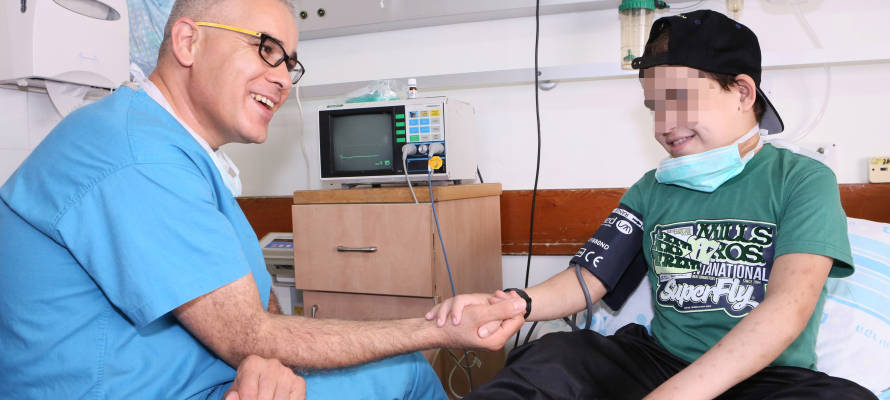Israeli doctors at Rambam Hospital in Haifa, using unique and innovative treatment, were able to save the life of a Palestinian teenager from Gaza.
For years, M, a 14-year-old boy from Gaza, had suffered from kidney failure. Recently, the youth’s doctor informed his family that without a transplant, the boy’s life would be at great risk. Exacerbating his condition, M’s blood also coagulated too easily, reducing the chance of a successful transplant.
Against all odds, with the donation of a kidney from his sister, doctors at Rambam Hospital in Haifa saved the boy’s life.
To stay alive, patients who suffer from kidney failure require a transplant. When that problem is intensified by excessive blood coagulation, they need a great deal of luck as well. M urgently needed a kidney transplant, but his blood condition further complicated his medical situation. This significantly lowered chances for a successful operation.
Doctors explained to M’s family that it was only a matter of time before his situation would deteriorate, preventing dialysis and greatly threatening the boy’s life. To save him, his sister decided to donate a kidney.
A History of Failed Attempts
Eight years ago, the boy had received a kidney donation from his brother, but the transplant, performed in Egypt, failed immediately. In light of this situation, Rambam Hospital doctors made it clear to the family that M’s chances for success were very low. Despite this, his sister insisted upon the donation.
Considering the state of M’s blood vessels, the doctors worked “in reverse,” executing a unique procedure tailored for M’s special needs.
Shortly after surgery, it became apparent that the unusual procedure could not stand up to the demands of the transplant. Two hours after leaving the operating room, the youth was back. Examinations revealed that all vascular connections performed by Rambam doctors were working, but M’s own blood vessels were not sustaining the transplanted kidney.
The Rambam medical staff had never been confronted with such a situation before. “It was a nightmare scenario,” said Dr. Ran Steinberg, head of Pediatric Surgery. To solve the problem, the doctors implanted a synthetic connector between the vein exiting the kidney and the one that exits the liver.
This innovative method worked and M’s body was able to function with the new kidney. After an eight-month stay at Rambam, the boy returned home to Gaza and still returns to Haifa for periodic check-ups.
“There are no words to describe the excitement of triumphing in an impossible situation. Not everyone believed we would succeed,” said Dr. Steinberg. “As soon as M started to recover, our doctors’ smiles returned. M is a great kid and he will be able to enjoy the regular life of any child his age.”
Long Israeli Track Record of Treating Palestinian Patients
This is by no means a singular event. Israeli hospitals have a long track record of treating Palestinian patients, in many cases free of charge.
Rambam Health Care Campus provides medical care to hundreds of patients from Gaza and the Palestinian Authority (PA) year round; 650 children and teenagers were treated there throughout 2013.
During Operation Protective Edge, as terrorists in Gaza were firing on Israeli citizens, hospitalized patients at Rambam Hospital included three adults and eight children from Gaza as well as three adults and two children from the PA. In addition, the Haifa hospital was treating seven patients from the PA in outpatient clinics.
A report published by Israel’s Coordinator of Government Activities in the Territories Unit (COGAT) shows that 219,464 Palestinian patients received medical treatment in Israeli hospitals during 2012, including 21,270 children.
Author: Aryeh Savir
Staff Writer, United with Israel
